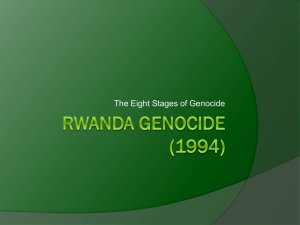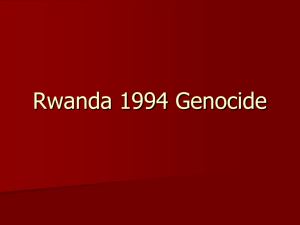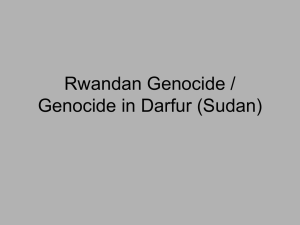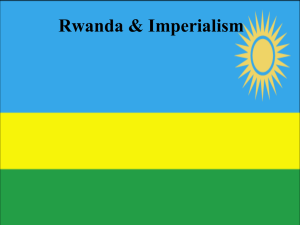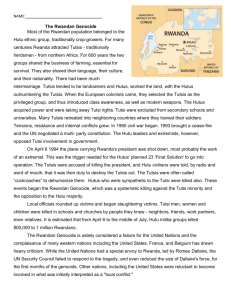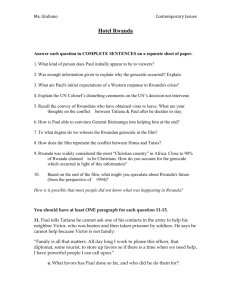FINAL POWERPOINT WII - GII-2010
advertisement
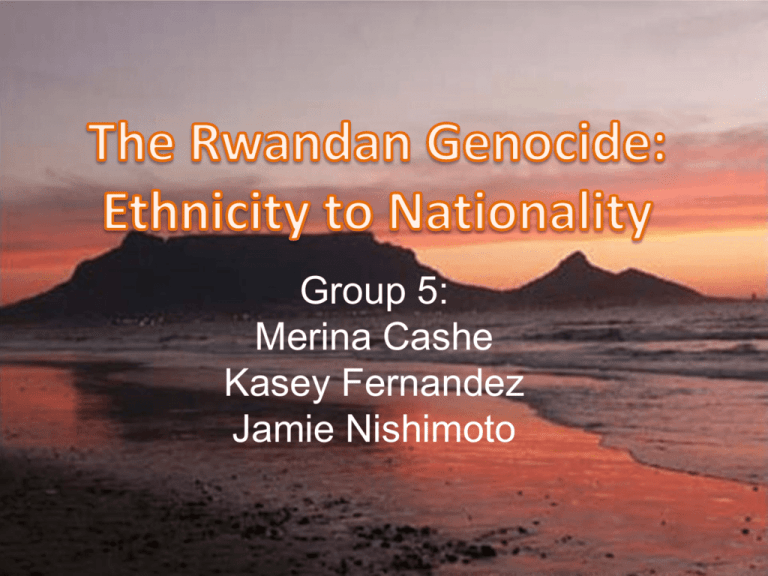
Group 5: Merina Cashe Kasey Fernandez Jamie Nishimoto Violent crimes committed against groups with the objective to destroy the existence of the group. •Killing the members •Causing serious bodily or mental harm •Preventing births •Forcibly transferring children of the group to another. “After the event started, the UN Security Council did not want to admit that the killings in Rwanda were ‘genocide’ because no one wanted to take action. When it was clear that genocide was going on, it was too late to prevent it from happening” -Unknown • Also known as the “land of a thousand hills” • Rwanda is a very mountainous country located in the heart of Central Africa. • Its bordering countries include, Uganda, Tanzania, Burundi, and Zaire. • Kinyarwanda, Bantu, French, Swahili, and English are often spoken in Rwanda. • Rwanda became an independent country on July 1, 1962. • In the 1800s, European colonists took over Africa and the national identity was created. • In the 1890s, German colonists signed a treaty with the Tutsi Rwandan king. – This treaty turned Rwanda into a colony. • Germans assumed that Tutsis were superior over the Hutus – In 1916, Belgians came into power and continued to favor the Tutsis. • Physical appearance of a person – Hutus (or Bahutu): Took over most of the population in Rwanda. • Average male around 5’5”, 130 lbs, darker skin color, shorter, and more muscular – Tutsis (Watutsi or Batutsi): Second largest ethnic group. • Taller (5’9”+), thinner (125 lbs), lighter skinned • Introduced into Rwanda in 1933 by the Belgian colonial government – Given to identify individuals from each ethnic group in their country – Used to shape, define, and perpetuate ethnic identity and background • Separation of three groups: Hutus, Tutsis, Twas • ID cards made killings in Rwanda much faster – Were like death certificates • Person was often asked to see ID card to identify as Hutu or Tutsi “The use of ethnicity by the Hutus made the genocide a reality” •Started on April 6, 1994, when President Juvenal Habyarimana was shot down in his plane. •Planned long before it started •People would hear screaming and gun shots outside of their homes. •Thousands of Tutsis & moderate Hutus were killed, raped or slaughtered. •Main promoter: radio broadcasts •Killings by neighbors, former friends, coworkers, or even relative through marriage. “Unborn children should be ripped from the wombs of dead Tutsi women who are pregnant” -Unknown •Huge role in genocide •Hutus blamed Tutsis for killing Hutu president. •Checking I.D. cards or looking at different features of their body. •All Tutsis were alike & they were the enemies •Time of opportunity to take land, money, and goods from Tutsis. •Tutsis nickname: “cockroaches” •Lasted for hundred days & ended on July 1994 •About a million Tutsis and moderate Hutus were murdered. •Rebel forces of RPF forced killers out of Rwanda •Overthrew genocidal government. •Many Hutus left Rwanda being scared of prosecution. •Widow of ex-president, Agathe Habyarimana, arrested for supposedly having a role in planning genocide. •Today, the president of Rwanda is Paul Kagame, who was the leader of the RPF army that helped stop the genocide. • Numerous changes since 1994 genocide: – New and improved ID cards • 1997; new government has eliminated group classifications from their ID cards. • Added administrative entities (city and province). • Light blue color and written in French and Kinyarwanda languages. • All information on ID cards include more comprehensive information about the bearer. – What has this done? • Helped to create a more uniformed country and has given rights to each individual of Rwanda • Social and ethnic problems AU PAU! – Present government has committed their country to be a non-ethnic society where all individuals are equal. • Want to include everyone in the running of the country • Respecting the rights of all citizens • Killers??? NO MORE! – Arresting people involved in genocide became one of the main issues for RPF leaders. • Help to ease the tension between Hutus and Tutsis – ‘Gacaca’ Courts – April 1995; approximately 7,000 • Traditional systems of community-based adjudication people were arrested for warused to prosecute perpetrators related crimes in Rwanda. – Presently; about 150,000 Hutus are in jails accused of taking • Used to encourage harmony part in genocide. and deal with past crimes of – Weekly meetings neighbors • People are still traumatized by the horrors of the war. • Live in fear because most killers were their family members, neighbors, or friends. • Negativity turns positive! – Trying to move beyond tribalism – RPA (Rwandan Patriotic Army) soldiers (who are Tutsi) caught for retaliation killings and sent to jail, some executed. • Grow, Grow, Grow – In 2008, growth in Rwanda reached 11% • One of the quickest nations to grow since their economic slump occurred. – Applied to be apart of the Commonwealth of Nations in 2007 and 2009 to be free form the French foreign policy. – Hundreds and thousands of Hutu refugees have returned to Rwanda from Zaire and Tanzania. • Helping to building population and economy in Rwanda – Present population: Around 10 million • Considered the most densely populated country in Africa. – ECONOMY RISIN’ • • • • • Bars and restaurants have re-opened Markets supplied with goods and produce Commerce (trade/exchange) becoming successful Newspaper publishing Rwanda radio on air • Moving on to become a country with more equality and respect. “No one is suggesting that every peasant who took a machete should be punished. But those who organized the peasants, who told them to hunt Tutsis and Hutus of the political opposition—the local government officials the soldiers, the politicians— they must be judged, tried, and punished.” –African Rights
